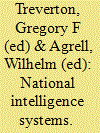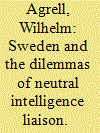| Srl | Item |
| 1 |
ID:
038296


|
|
|
|
|
| Publication |
Stockholm, s.n, 1977.
|
| Description |
52p.
|
|
|
|
|
|
|
|
|
|
|
|
Copies: C:1/I:0,R:0,Q:0
Circulation
| Accession# | Call# | Current Location | Status | Policy | Location |
| 016822 | 355.3432/AGR 016822 | Main | On Shelf | General | |
|
|
|
|
| 2 |
ID:
093306


|
|
|
|
|
| Publication |
New York, Cambridge University Press, 2009.
|
| Description |
viii, 294p.
|
| Standard Number |
9780521518574
|
|
|
|
|
|
|
|
|
|
|
|
Copies: C:1/I:0,R:0,Q:0
Circulation
| Accession# | Call# | Current Location | Status | Policy | Location |
| 054702 | 327.12/TRE 054702 | Main | On Shelf | General | |
|
|
|
|
| 3 |
ID:
111185


|
|
|
|
|
| Publication |
2012.
|
| Summary/Abstract |
A growing interest in the history of intelligence might be a way to learn more about not only the past, but also the dynamics shaping the future of intelligence. Intelligence is an evolving activity and the twentieth-century experience must be regarded as a phase in an ongoing transformation of its institutions, methods and roles. At least six fundamental processes can be identified as relevant to this re-shaping of intelligence in long perspective; the decreasing hegemony of national intelligence, the rise of new fields of knowledge with intelligence relevance, the diminishing relative importance of exclusive sources and methods, the rise of new actors producing and providing intelligence, the loss of an intellectual monopoly in a competitive knowledge environment and finally an increasing demand for reliable assessments and verification in a fragmented world of information.
|
|
|
|
|
|
|
|
|
|
|
|
|
|
|
|
| 4 |
ID:
073526


|
|
|
|
|
| Publication |
2006.
|
| Summary/Abstract |
Throughout the Cold War Sweden pursued a declared policy of non-alignment. Sweden nevertheless established security links with a number of Western powers, first of all Britain and the US. The most extensive links were developed in two areas - military technology and intelligence. Intelligence liaison was of crucial importance for the security of non-aligned Sweden, but also significant for the major Western powers in filling gaps in intelligence collection. But intelligence liaison also served as an instrument in a closed policy arena where Sweden could receive or pay back favours, according to a pattern established already during World War II. However, intelligence liaison contained policy dilemmas, some of a more general nature, some specific for a country with an overt policy of non-alignment.
|
|
|
|
|
|
|
|
|
|
|
|
|
|
|
|